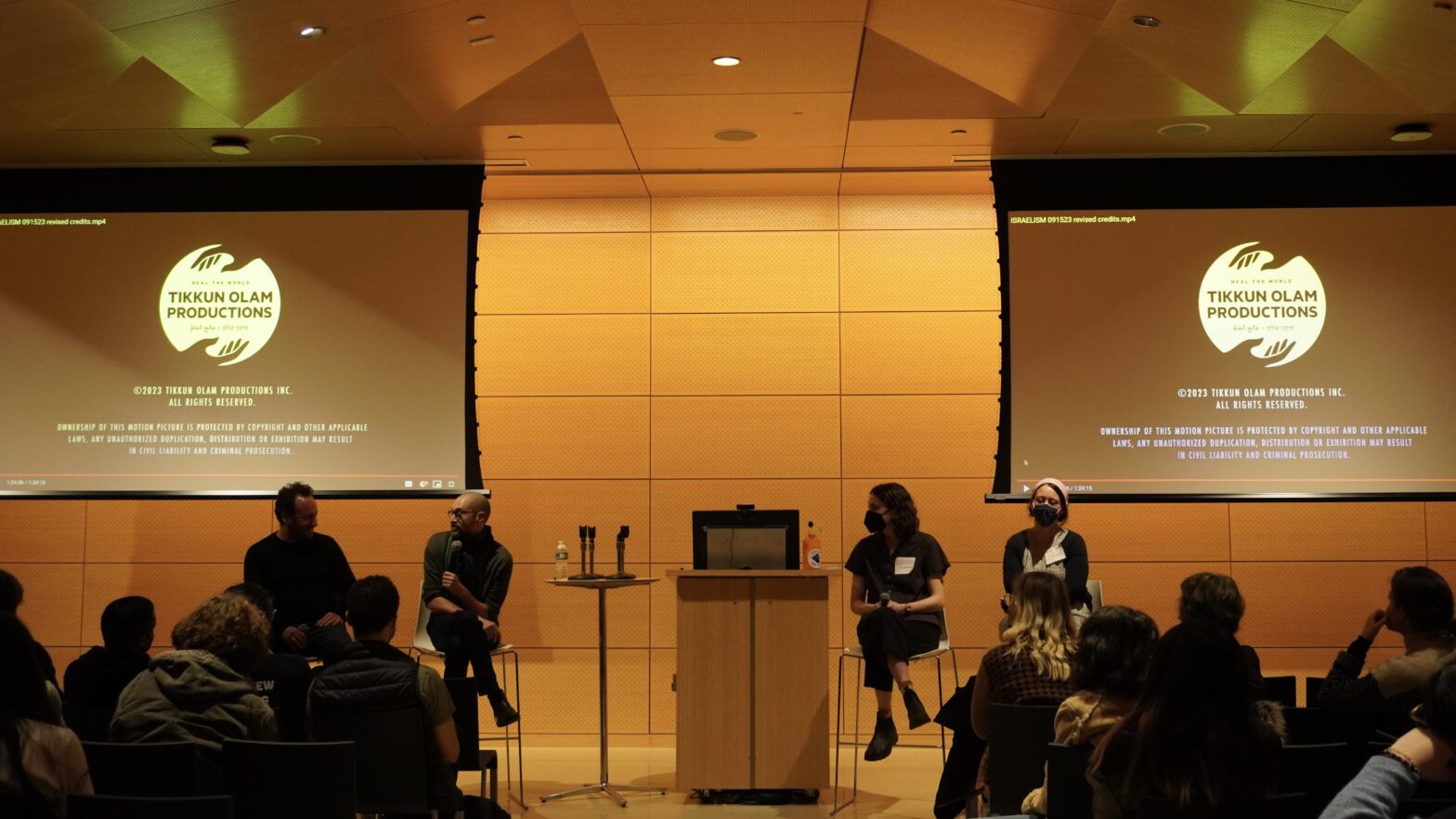This story was updated on Feb. 5 at 7:20pm.
About 50 students, faculty, and staff gathered at the University Center for a screening of “Israelism,” a documentary about the division of the Jewish community. With two American Jews as its centerfold, they embark on a journey of discovery through witnessing the ongoing apartheid of Palestine and redefining their relationship between Judaism and Israel.
The Jewish Culture Club (JCC) hosted a screening of the 2023 documentary on Tuesday, Jan. 30. “Israelism” executive producers Gili Getz and Brian A. Kates sat down for a Q and A with the audience afterward. JCC was joined by many other New School community members and student organizations, including Hillel and Students for Justice in Palestine (SJP).
The Starr Foundation Hall, located in the University Center, was almost filled to capacity with New School community members nestled in with popcorn and snacks for the screening. The significant turnout can be attributed to the JCC putting up promotional posters on campus and social media for the event. SJP also promoted the screening on their social media beforehand.
The film took roughly seven years to create and was released in February 2023. Upon its release, “Israelism” was met with positive responses but also negative backlash from the divided Jewish community. However, after the Hamas attack on Israel on Oct. 7, 2024, the film gained significant attention at universities and throughout the United States.
Institutions that screened the film in their communities received many complaints and calls to cancel the screenings, according to The New York Times. Getz also said he received more than 17,000 emails of criticism about the film. The campaigns to end the screenings eventually made their way to the desk of Ann Kirschner, Interim President of Hunter College, he said.
Since the film ignited tensions at institutions across the country, JCC was extra cautious when planning the screening. The event had one security guard on standby at the door and four student de-escalators in the screening room. However, the screening went on without incident, so the extra staff never had to intervene.
Ramona Saft, a senior at Eugene College of Liberal Arts and the president of JCC, said that before the screening took place, people were tearing down JCC’s posters that promoted the film, and the JCC was sent “some very unapproving messages” by email and Instagram direct message.
Nonetheless, the screening remained on schedule as Saft “wanted to give the people the opportunity to watch it.”
Louisa Solomon, the TNS rabbi-for-students, said she was pleased with what JCC had accomplished with the event. She said JCC was “bold and willing to stand up and say what they believe in and welcome everyone into the conversation, and I’m super proud of them for modeling that kind of Jewish community.”
Solomon was present during the entirety of the event and offered support to the audience after the film to encourage in-depth conversations. “I’m all here for it,” she said.
During the Q and A that took place after the film, many audience members were able to bond over shared experiences of growing up as Jewish or Palestinian. When students and faculty explained their stories to the producers and expressed how the film resonated with them, other audience members were seen nodding in agreement and clapping.
The New School Free Press asked Getz about different institutions refusing to show the film to their community. He replied that the problems arose from the lack of communication and discussion about the content of the film. Canceling screenings would only mask the problem.
“Everybody has the right to do whatever they choose, wherever it’s comfortable, wherever it’s great for the community…I would position this against the tendency not to have this conversation at all,” Getz said.
He went on to explain how deep-rooted the intergenerational divide is within the Jewish community and how it extends beyond the discussion about the Palestinian struggle. Getz explained that both issues are connected and neither can be solved without confronting one another.
One student asked the producers about their success in bridging the divide between the Jewish and Palestinian communities. Getz expressed that his success is witnessing students from different backgrounds having conversations about mending the gap between Israel and Palestine, by learning more about the current state of Palestine.
“It’s the barrier to break. But it’s beautiful to see that it is possible because the truth is what grounds us.” Getz said about having screenings of his film.
With Saft being president of the JCC for two years now and participating in the club for three, she too is trying to connect the groups. Saft is excited to continue to grow the non-traditional Jewish space at TNS, where she feels “it can be really hard” on college campuses. Saft was looking for a space that was not bound by Zionism, and at TNS, she was able to find it.
“We’re an organization with a lot of varying ideas about Zionism and are really committed to welcoming voices of dissent. Explicitly include non-Zionist, anti-Zionist, and diaspora Jews in our discussion and in our community,” Saft said.
The original version of this story incorrectly referred to President Joe Biden, instead of Ann Kirschner, Interim President of Hunter College. The article has been updated to reflect the correction.








There may be an argument whether Israel is central to Judaism and whether Zionism is an integral part of Judaism.
There can be no argument that support for the perpetrators of the October 7th pogrom and the whitewashing of the pogrom is not Judaism !
Thanks for letting us know! We’ve updated the article to reflect the correction.
I’m misquoted in this article. In the quote:
“eventually made their way to President Joseph Biden’s desk,” he said.
What I actually said and is in the article linked is “eventually made their way to President of the University (Hunter – Ann Kirschner).
Please correct – thank you!!!!
Gili Getz